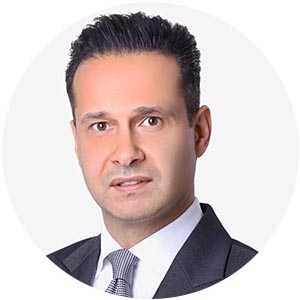M&A tops charts as transaction prices moderate across the region, industries consolidate, and key nations pursue privatization.

The sustained slump in oil prices has created significant opportunities for investment bankers in the Middle East. Sovereign borrowing (much of it in the form of sukuk, or Islamic bonds) is picking up in the oil-producing countries of the Arab Gulf. Meanwhile, a wave of privatizations, including the possible sale of a stake in Saudi Aramco, the national oil company, could help plug budget gaps. Mergers and acquisitions involving Middle Eastern companies are coming off their biggest year since 2008, according to Thomson Reuters.
“Valuations are becoming more realistic, and we expect an increase in private-sector dealmaking, noticeably in middle-market M&A, as well as government-driven privatization initiatives,” says Omar Mehanna, managing director and head of merchant banking at National Bank of Abu Dhabi. “Despite the prevailing global and regional volatility in public markets, we are positioning our merchant-banking platform to capitalize on the opportunities that will arise,” he says.
While international banks still dominate investment banking in the Middle East, they have been retrenching investment and commercial banking activities in recent years, according to Mehanna, and local and regional banks have played an important role in filling the void. “Clients are becoming more inclined to hire regional banks for their understanding of and long-term commitment to the region, as well as their human capital, given the recent hiring of highly skilled professionals with international banking experience,” he says.

The United Arab Emirates (UAE) is better positioned from a macro perspective than some of the other regional economies, given its diversified economy, Mehanna says.
“We anticipate challenging equity capital markets in the intermediate term,” he says. “We should see a return of fundamentally sound businesses with solid equity stories looking to IPOs, once markets stabilize.”
Mohamed Fahmi, Dubai-based managing director at EFG Hermes Investment Banking, says falling oil prices have affected all the region’s industries: tourism, industrials, construction and real estate, and, to a lesser extent, consumer-driven businesses. “A number of companies, particularly those in cyclical industries, are underperforming as a result of the macroeconomic environment, as opposed to management ability, which creates opportunities in M&A,” he says. “Financial investors with cash to deploy, as well as strategic investors looking to consolidate, seek to buy quality assets as valuations come under pressure.” The focus of investors is shifting from buying only high-growth companies to acquiring attractively valued businesses as well.
Meanwhile, in the Gulf, governments have less oil revenue, which is creating a liquidity constraint, he says. The banks can no longer be the sole source of funding for fiscal deficits, so governments will be forced to tap into the bond markets, either secular or Islamic, which will help to build a more sophisticated financial system, he says.
Privatization of government-owned companies will be another source of new funding, Fahmi believes, adding, “This could be particularly important in Egypt, where an asset sale by the government would not only provide much-needed funds but would also issue a strong positive signal to the corporate world, and could jump-start investment.”
The outlook for investment banking in Egypt is very positive, particularly in the long term, according to Fahmi. “A lot of companies will be looking to raise capital to take advantage of growth opportunities, strategic investors will continue to consider acquisitions in Egypt, and we expect to see consolidation in some sectors,” he says.
“Given Egypt’s macroeconomic fundamentals and almost perfect demographics, we expect to see a lot of activity in consumer-related equity issues and M&A activity,” Fahmi adds. “Businesses with the right management teams will continue to do well and adapt, and we hope to be able to transact on many of these, whether privately or in the public domain.”
EFG Hermes ranked number one in underwriting fees in the region’s equity capital markets last year.

In 2015, outbound M&A involving Middle East companies rose 34% from a year earlier, according to Thomson Reuters. The largest deal was the $11.1 billion acquisition of South Africa’s Mediclinic International by UAE’s Al Noor Hospitals Group.
The region’s markets have a strong sector concentration in real estate, telecommunications and financial services, Fahmi says. “This has been the case for many years, and the market is starved for new and unique investment stories,” he notes. “Investors and companies alike are having to look outward to diversify their portfolio and expand their footprint.”
Simon Penney, head of wholesale and international banking at FGB, formerly First Gulf Bank, says the UAE is unique in that it has a solid diversification strategy and investments in infrastructure, which have helped to create a resilient and sustainable economy, and there will be opportunities for all banks. “The companies we deal with are adjusting their business models, which may create consolidation requiring advisory and acquisition finance,” he says. “We are seeing clients more focused on optimizing their working capital cycle.”
Penney says the UAE’s banking sector remains “strong, dynamic and competitive, with healthy liquidity levels.” There will be many opportunities in 2016, Penney says. “The winners will be those banks that adjust most quickly to the new operating environment,” he says. Loan syndications will remain a big opportunity, notably in support of infrastructure investment, but the costs will increase, he says.
“Investment banking moves in cycles, and we have seen local banks move up the league tables, particularly in syndicated loans and bonds, between 2011 and 2014,” Penney says. “This was driven by international banks’ downsizing their regional presence, with talent moving into local banks. However, this slowed somewhat in 2015, and we are now seeing international banks recapture some of the lost market share,” he explains.
Current low oil prices likely will continue through 2016, due to oversupply, according to economists at Riyadh-based Jadwa Investment. As Iran comes back on line, global competition will intensify, they wrote in a recent report. Lower-for-longer oil prices will cause a steep decline in government spending in Saudi Arabia, Jadwa says. Meanwhile, increases to domestic energy and water prices, as subsidies are cut, will boost inflation in the kingdom to 3.9% from 2.3% in December 2015, the firm forecasts.
Economists at Samba Financial say 2016 will be extremely challenging for the Saudi economy, with little or no expansion of the non-oil sector. “The government appears committed to getting the fiscal position back on a sustainable footing, even if that means a much weaker growth performance,” they wrote in a recent report.
According to Samba, the Saudi government’s commitment to spending restraint, coupled with the substantial scope for domestic debt issuance, should relieve pressure on international reserves, enabling the authorities to comfortably maintain the exchange rate peg to the dollar. Furthermore, private investment in the kingdom will take its cue from government spending and will almost certainly contract this year. Efforts to attract foreign direct investment and portfolio inflows will be stepped up, and the likely inclusion of the Saudi stock market in the MSCI emerging markets index from 2017 will help. “A concerted and realistic privatization effort should also attract foreign capital,” Samba reports.
Meanwhile, investment bankers say 2016 is shaping up to be an active year, despite the slump in oil prices.
TOP MIDDLE EAST DEAL ADVISERS, BOOKRUNNERS IN 2015 | ||||
|---|---|---|---|---|
|
M&A FINANCIAL ADVISERS |
Rank Value ($billion) |
Rank |
% Mkt Share |
# of Deals |
|
Morgan Stanley |
18. 40 |
1 |
32.7 |
10 |
|
Rothschild |
14. 84 |
2 |
26.4 |
7 |
|
Goldman Sachs |
14. 82 |
3 |
26.4 |
3 |
|
Rand Merchant Bank |
11. 08 |
4 |
19.7 |
1 |
|
Jefferies |
11. 08 |
4 |
19.7 |
1 |
|
Industry Totals* |
56.21* |
641 | ||
|
EQUITY CAPITAL MARKET BOOKRUNNERS |
Rank Value ($billion) |
Rank |
% Mkt Share |
# of Deals |
|---|---|---|---|---|
|
HSBC |
0. 948 |
1 |
16.5 |
3 |
|
Deutsche Bank |
0. 868 |
2 |
15.1 |
3 |
|
EFG Hermes |
0. 581 |
3 |
10.1 |
5 |
|
Barclays |
0. 437 |
4 |
7.6 |
1 |
|
BNP Paribas |
0. 437 |
4 |
7.6 |
1 |
|
Bank of America Merrill Lynch |
0. 437 |
4 |
7.6 |
1 |
|
Societe Generale |
0. 437 |
4 |
7.6 |
1 |
|
Industry Totals* |
5.744* |
20 |
|
DEBT CAPITAL MARKET BOOKRUNNERS |
Rank Value ($billion) |
Rank |
% Mkt Share |
# of Deals |
|---|---|---|---|---|
|
Nomura |
8. 15 |
1 |
27.0 |
6 |
|
HSBC |
2. 54 |
2 |
8.4 |
20 |
|
Citi |
2. 51 |
3 |
8.3 |
15 |
|
Standard Chartered |
2. 11 |
4 |
7.0 |
19 |
|
National Bank of Abu Dhabi |
2. 10 |
5 |
7.0 |
16 |
|
Industry Totals* |
30.2* |
62 |
Source: Thomson Reuters
*Figures may not add up to 100% as more than one bank typically obtains credit for any one transaction.



